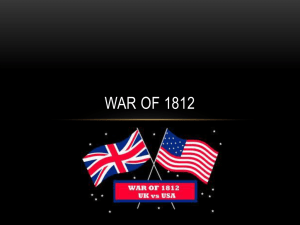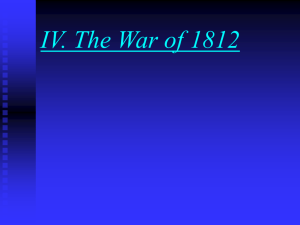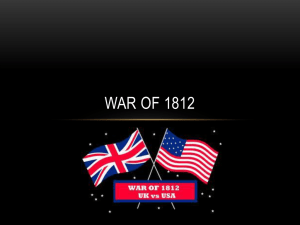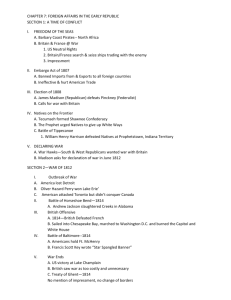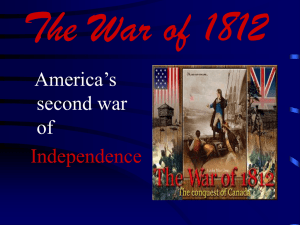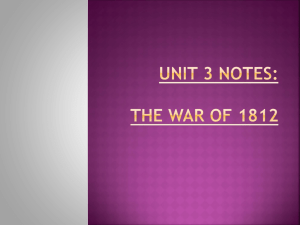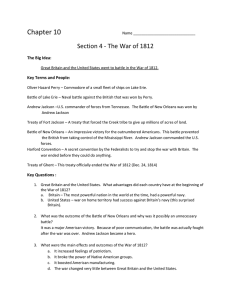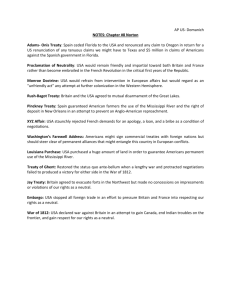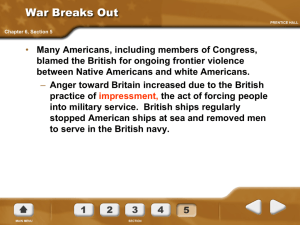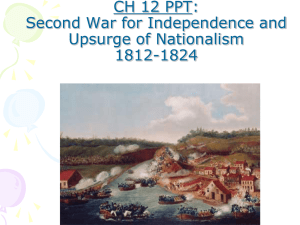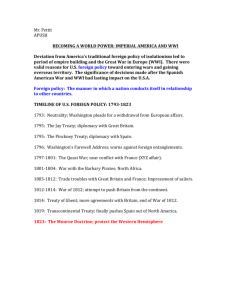War of 1812
advertisement
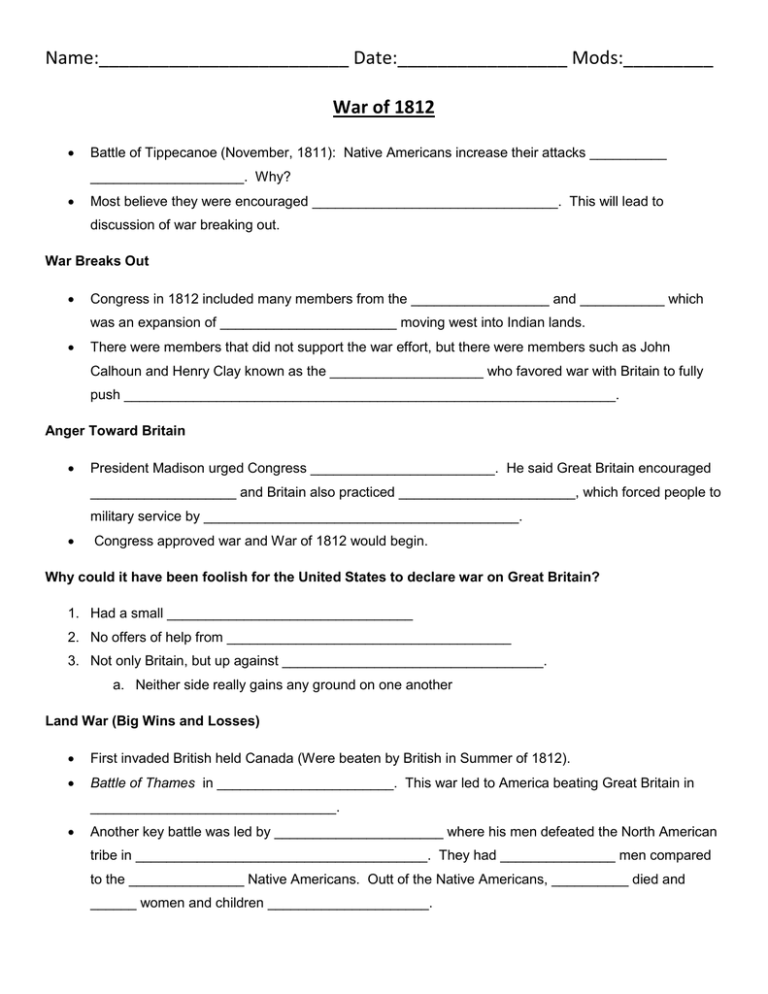
Name:_________________________ Date:_________________ Mods:_________ War of 1812 Battle of Tippecanoe (November, 1811): Native Americans increase their attacks __________ ____________________. Why? Most believe they were encouraged ________________________________. This will lead to discussion of war breaking out. War Breaks Out Congress in 1812 included many members from the __________________ and ___________ which was an expansion of _______________________ moving west into Indian lands. There were members that did not support the war effort, but there were members such as John Calhoun and Henry Clay known as the ____________________ who favored war with Britain to fully push ________________________________________________________________. Anger Toward Britain President Madison urged Congress ________________________. He said Great Britain encouraged ___________________ and Britain also practiced _______________________, which forced people to military service by _________________________________________. Congress approved war and War of 1812 would begin. Why could it have been foolish for the United States to declare war on Great Britain? 1. Had a small ________________________________ 2. No offers of help from _____________________________________ 3. Not only Britain, but up against __________________________________. a. Neither side really gains any ground on one another Land War (Big Wins and Losses) First invaded British held Canada (Were beaten by British in Summer of 1812). Battle of Thames in _______________________. This war led to America beating Great Britain in ________________________________. Another key battle was led by ______________________ where his men defeated the North American tribe in ______________________________________. They had _______________ men compared to the _______________ Native Americans. Outt of the Native Americans, __________ died and ______ women and children _____________________. Treaty of Fort Jackson (1814): ____________________ acres of land which covered most of present day _____________________ and South ________________________. Naval War Outnumbered American ships ________________. Early victories for Americans and the privateers capture over _______________________________. However, a number of defeats weaken US navy. A big turn around in the naval perspective of the war was the US winning battle to control ___________ _____________. After this, the British decided to blockade_____________________________. Burning of Washington D.C British land on _________________________ where they find success in battles and go after _______. The _____________________________ of the United States flee Washington D.C. It is set on fire including _________________________________. Britain decided to go after ___________________ next. Francis Scott Key: ____________________/wrote about bombardment of ______________________. American forces in Baltimore were able to turn back the enemy and this was the end of the war. National Treasury empty, the Capitol laid in ruins, and blockade brought trade to standstill. Hartford Convention New England suffers substantial losses in __________________. They called a meeting in ________ _____________ to consider leaving the nation. All they asked for was more ___________________. Treaty of Ghent: December 24th, 1814 where they met in ________________. 1. Did not resolve issues that _________________________ which was the practice of ______________ ______________________________. 2. United States and British territory were _____________________. Many in the United States were happy that the ___________________________. Battle of New Orleans During this time, there was very slow communication. News of a treaty did not reach United States until __________________________. British force of more than __________________ tried to take ________________________ from the South. Jackson and ______________________ come from Mississippi Valley. British try to stand toe to toe with America which were _____________________________________. Although this was after the treaty was signed, it was a positive note for America because it _________________________, restored _______________________, and made Andrew Jackson a _________________________. Election of 1816: James Monroe wins election (Republican Party) as Federalists start to fade ____________ ___________________. Panic of 1819 1. First Bank of United States dissolved (1811) 2. Second Bank of United States established (1816) which gave credit to people in order to move westward. 3. In 1819, London banks _____________________________________________________. 4. The United States turned to people who ________________________________________. 5. If you borrowed too much money at the time, you were ruined. Missouri Compromise Congress began debating whether they should allow admission of the state of ___________________ to the United States. What was the issue? The problem was the _______________________________ which said that no state northwest of Ohio River could _______________________________________________. North objects saying there will be an ________________________________ to the Southern states in the Senate (11 free, 11 slave). The South said “if you tell Missouri they cannot be slave state, they can do it with other states as well.” 1. Missouri could be a slave state because ___________________ and became a _________________. Why did this help balance the power? 2. When United States expanded westward, territories North of 36 degrees 30’N latitude in _____________________________________ would be closed to __________________________.
